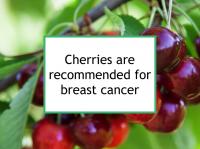Cherries (Prunus avium), also known as sweet cherries, are a rich source of phytonutrients with breast cancer chemopreventive properties, including anthocyanins such as cyanidin-3-glucoside. Cherries also incorporate some fiber, melatonin and quercetin, as well as ursolic acid and its structural isomer oleanolic acid.
Tart or sour cherries (Prunus cerasus) are a superior source of melatonin (with approximately six times the melatonin content of sweet cherries).
Breast cancer-related effects of eating cherries
Few population studies have addressed the effects of consuming cherries on breast cancer. However, cherry extracts and cherry micronutrients have been shown to inhibit breast cancer growth, proliferation, migration and angiogenesis in cell and animal studies.
Cherry extracts
Cherry extracts have been reported to inhibit the growth and proliferation of breast cancer cells. For example, one study reported that dark sweet cherry extract inhibited the growth of both triple negative (ER-/PR-/HER2-) and HER2 overexpressing (HER2+) breast cancer cells without toxicity to normal breast cells. Another study demonstrated that dark sweet cherry extract suppressed tumor growth in a mouse model of ER-/PR-/HER2+ breast cancer.
In addition, tart cherry extract has been shown to reduce bone loss in older women and to improve joint pain in women being treated with aromatase inhibitors.
Cherry anthocyanins
Cherries contain relatively high levels of anthocyanins (flavonoids that result in intense red coloration), giving them antioxidant, anti-inflammatory and chemopreventative properties. For example, cyanidin-3-glucoside has been shown to possess both chemopreventive and chemotherapeutic activity, and to enhance the treatment effects of trastuzumab (Herceptin).
Delphinidin, an anthocyanidin found in tart cherries, has been shown to block epidermal growth factor receptor (EGFR) signaling in breast cancer cells. EGFR is expressed at high levels in at least 30% of breast cancers and is associated with a poor prognosis. Delphinidin has also been demonstrated to induce apoptosis (programmed cell death) in HER2+ breast cancer cells and to inhibit angiogenesis and migration of triple negative breast cancer cells. Generally speaking, tart or sour cherries have higher concentrations of anthocyanins than sweet cherries.
Melatonin
As noted above, while cherries contain some melatonin, sour cherries are an abundant source. Melatonin protects against breast cancer in several ways, including by reducing aromatase activity within the breast, thereby decreasing estrogen production and protecting against ER+ breast cancer. Melatonin has also been found to be effective in reducing tumor growth, cell proliferation, and angiogenesis in an animal model of triple negative breast cancer. In addition, melatonin has been reported to increase the anticancer effects of doxorubicin while reducing the doxorubicin-induced cardiotoxicity and chemo brain. Melatonin has also been shown to enhance the treatment effects of cisplatin, paclitaxel, radiotherapy and tamoxifen.
Ursolic acid
Ursolic acid, which is found in cherry skins, has been shown to inhibit tumor formation and growth in all of the major breast cancer receptor types (ER+/PR+, HER2+ and triple negative). Ursolic acid has also been reported to inhibit aromatase (the synthesis of estrogen from androgens within the body), thereby strengthening the treatment effects of aromatase inhibitors.
In addition, ursolic acid has been shown to reverse multidrug resistance in breast cancer cells. For example, one study found that ursolic acid reversed resistance to paclitaxel in paclitaxel-resistant triple negative breast cancer. Another study reported that ursolic acid resensitized multidrug resistant ER+/PR+ breast cancer cells to doxorubicin. Still another study demonstrated that ursolic acid increased the sensitivity of triple negative breast cancer cells to doxorubicin.
Additional comments
Non-organic cherries must be washed very thoroughly to remove pesticide residue.
Sources of information provided in this webpage
The information above, which is updated continually as new research becomes available, has been developed based solely on the results of academic studies. Clicking on any of the underlined terms will take you to its tag or webpage, which contain more extensive information.
Below are links to 20 recent studies concerning this food and its components. For a more complete list of studies, please click on cherry.
